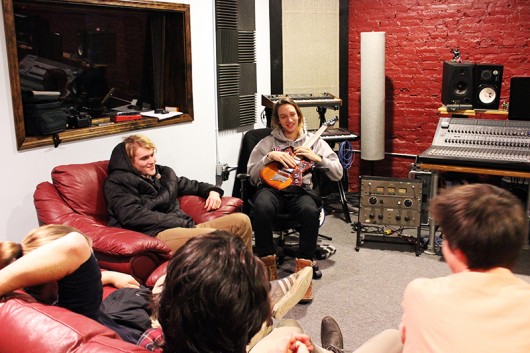
From left, lead vocalist and guitarist Dallin Stevenson and lead guitarist and vocalist Sean Gleeson begin to laugh while listening to their bandmates tell stories. Credit: Zak Kolesar | Lantern Reporter
In an attempt to shine light on local music, The Lantern’s “Columbus’ Own” is a weekly series that will profile a new Columbus band each week.
An island can represent an escape from traditional values, making Turtle Island an aptly named unit. The members show no interest in conforming to local trends, standing isolated behind a sound created from a potpourri of musical influences.
The experimental Columbus rock collective consists of members who have been musically connected since attending high schools close in proximity. They have grown up with and in the Columbus music scene, but their latest vision share little with any of Columbus’ current trends.
“I think that’s been a consistent goal for us; we like to surprise people and do new things and also surprise ourselves,” said lead vocalist and guitarist Dallin Stevenson. “We don’t want to find one sound and just stick to it.”
Settling on one sound is difficult for the now five-member ensemble, which added bassist Andy Sullivan and keyboardist Joel Blaeser to the original trio that Stevenson, lead guitarist and vocalist Sean Gleeson and drummer Nicholas “Ace” Gerden formed in high school.
“I think from show to show we’re always changing and evolving and hopefully getting better,” Stevenson said.
The members’ musical backgrounds vary from classical to experimental; their individual tastes range from Radiohead to Flying Lotus to Animal Collective; their conversations vary from validating Kid Rock as the best stage name to peculiar anecdotes about Creed.
But after a couple of years, the band’s new lineup is finally in sync.
“We kind of adapted to five people who all have different styles,” said Gleeson, a third-year in strategic communication. “We listen to a lot of different music, so really anything can happen when you bring a new idea.”
Before Sullivan and Blaeser joined Turtle Island, the group possessed the sound of a raw rock group. After their inception, the group adopted a more electronic and technical approach to its music.
“I think that’s a really interesting way to take our music: start from the computer then adapt to our physical instruments,” Blaeser said.
A hint of what is to come from Turtle Island can be sampled on January 2015’s release, “Ouija Boys.” Computer mixing helps plot out a reverberant vibe for the track, while also layering euphoric echoes within Stevenson’s and Gleeson’s voices and guitars.
Since the release of “Ouija Boys,” the members of Turtle Island have grown to learn the musical blueprints of their bandmates. They understand each other’s roles and have no plans to establish a distinct, permanent sound.
And it all stems from one mutual feeling: trust.
Trust allowed Stevenson, Gleeson and Gerden to adapt to Blaeser and Sullivan’s classical upbringing, which brought structure and discipline to a previously sloppy composition.
“One practice we kind of had a fight when we suggested practicing with the metronome,” said Sullivan, a third-year in neuroscience and philosophy. “We changed our attitudes after that and now we wouldn’t go back to the other way.”
Turtle Island is in the midst of an experimental phase. It is trying to expand its musical horizon by adding various gear to its mix. That includes becoming well-versed with Ableton Push, a music sequencing controller designed for live performance.
“We think gear is important because it’s not just a medium, but it’s also a part of how the song comes to be in the first place,” Sullivan said.
Part of the evolution process for Turtle Island will include putting out an album incorporating its newfound electronic instruments, with the goal of hitting the festival circuit this upcoming spring and summer and getting signed to a label. Putting together a package of carefully picked singles from its upcoming project is a good starting point.
The group says the latest music on tap is some of its most serious and technical work to date.
“It’s weird to sit on those (songs) and have those be the songs we’re about to release in hope of making something happen,” Stevenson said.
The anticipation surrounding whether its new work will be well-received or not is a nerve-racking feeling for the band. A contributing factor to the band’s collective uncertainties are the personal connections to its upcoming project.
“We’re all kind of young adults and figuring out what it’s like to become an adult,” Stevenson said. “Not like it’s a teen angsty kind of thing, but just a lot of interesting ways in which people interact with each other and how that affects you and how that shapes your worldview.”
Turtle Island will be performing at Spacebar on March 26 with Manray and Sleep Feet. Admission is $7 for ages 18-20 and $5 for 21 and up.

